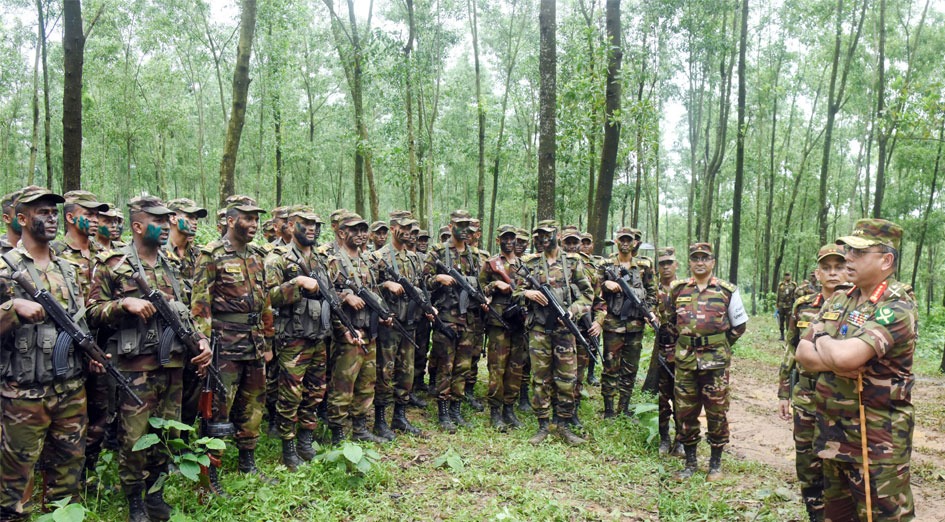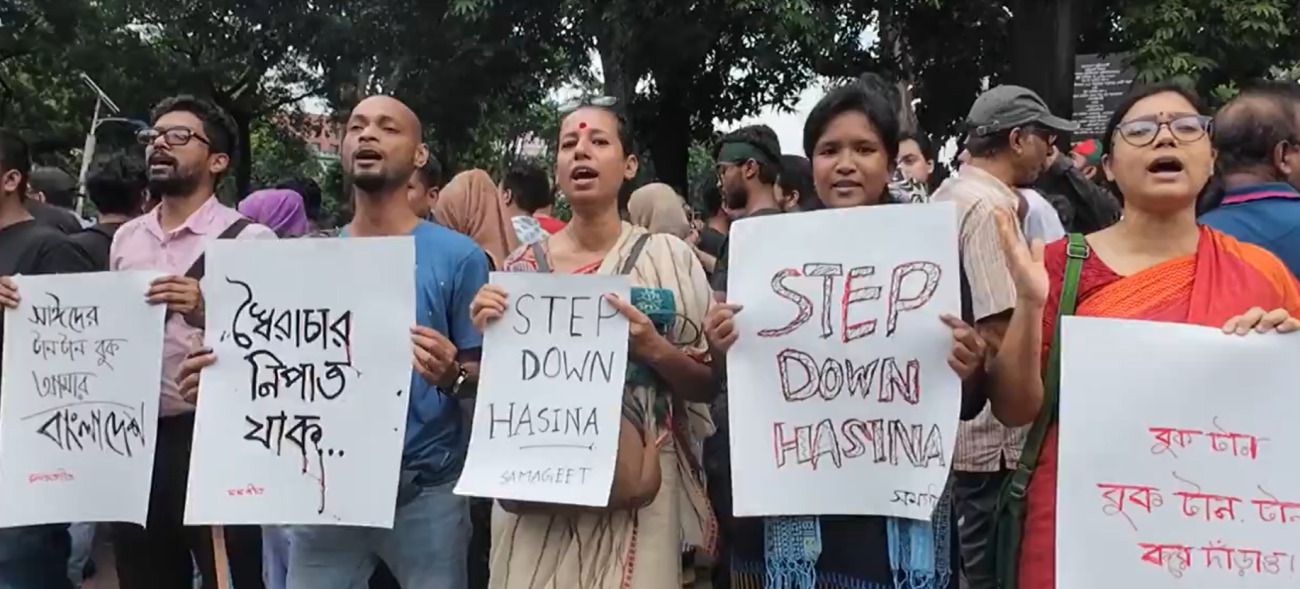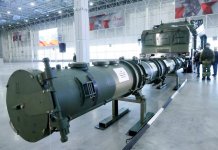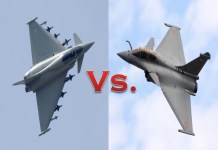With the Army in Bangladesh now in control after Prime Minister Sheikh Hasina’s “forced” abdication of power, the South Asian country is now the ninth in the world under military rule.
The other eight are Mali (since August 2020), Myanmar (since February 2021), Chad (since April 2021), Guinea (since September 2021), Sudan (since October 2021), Burkina Faso (since January 2022), Niger (since July 2023) and Gabon (since August 2023”. Of course, there could be countries like Pakistan that are effectively under military control as the elected leaders are toothless.
Given the history of the Bangladesh Army exercising executive power directly and indirectly in between 1975 and 1991, this is not exactly a new role for it. But, considering its subsequent internal transformation and international exposure through peace-keeping operations under the United Nations, apart from some hard lessons it learned from as many as 29 coups, including those successful and some failed attempts between 1975 and 2011, it is highly unlikely that the Army-Chief, General Waker-uz-Zaman, is keen on a prolonged military rule.
There are strong reasons to believe that he may abandon his proposal of the military forming an interim government. Student protest leaders are calling for Nobel laureate Muhammad Yunus to lead a temporary administration.
Can Modi Apply India’s Korea Strategy To End Ukraine-Russia War As PM Set To Meet Zelensky?
It is not that Bangladesh’s armed forces inherited respect for civilian rule, something inherent in their Indian counterparts. After all, many of them were part of the Pakistani military until 1971. Even when the country became independent of Pakistan, many Bangla officers were repatriated from the Pakistani forces. But they did face a problem on return.
The new armed force of independent Bangladesh also included those who fought for liberation – rebel officers, privates, and civil militiamen recruited by nationalist and even Marxist parties.
In other words, the Bangladeshi Army was a mix of two factions – those who had repatriated from Pakistan and those who had fought for independence.
Scholarly works on the Bangladesh Armed Forces suggest that these two factions always competed for dominance not only at the top levels but also in the middle ranks. In fact, the first coup in 1975 and the subsequent ones until 1982, when General Hussain Muhammad Ershad took over, were the results of the rivalry between these two factions; a ruler with the support of or close proximity to one faction was toppled by the leader of the other faction.
The point is that, unlike the Pakistani Army, the one in Bangladesh has never been that homogeneous, which is important for prolonged military rule. Invariably, military coups or dominions take place in countries where the armed forces come from a dominant community, class, or region.

For example, in Pakistan, the Army has an overwhelmingly dominant representation of about 70 percent from Punjab, its largest state, and most of its officers happen to come from the upper feudal strata of the society.
It is worth remembering why India, which shares borders with Pakistan and Bangladesh, has not been military-dominated. Two reasons are particularly noteworthy.
One, of course, is the democratic nature of its freedom struggle and deep commitment to democracy by India’s political leaders, cutting across parties and regions soon after independence.
Two, the Indian armed forces have been thoroughly heterogeneous in the sense that their composition has been drawn from not only all the regions of a vast country but also representatives of all classes, castes, and ethnicities. This explains why a subedar’s son like General Dalbir Singh Suhag could become the Chief of Army Staff (COAS). But it is unthinkable in Pakistan.
Bangladesh’s Army may not be as diversified as India’s, but it is said to be more heterogeneous than Pakistan’s. According to a profile not long ago by a former Bangladeshi Army officer of what is called socio-economic status (SES), officer intakes in the military reflect their changing economic background.
In fact, the prevailing global trend is seen in Bangladesh as well; here, the military is not among the preferred choices of well-educated youth who are more interested in well-paid civilian and private sector jobs. This is unlike the case in Pakistan, where the military is still the first choice, given its preponderance and power in Pakistani polity.
The point here is that if a career in the military is not considered the best or the only respected job in the country, there is a lesser likelihood of that country coming under military rule.
Besides, it is worth remembering the late American political scientist Samuel P. Huntington’s 1957 classic book, “The Soldier and the State: The Theory and Politics of Civil-Military Relations,” which discussed “the theory of objective civilian control,” according to which the optimal means of asserting control over the armed forces is to professionalize them. This is in contrast to “subjective control,” which involves placing legal and institutional restrictions on the military’s autonomy.
According to Huntington, ‘professionalism’ entails a mutually binding relationship between society and its ‘professionals’ (officers). The latter are entrusted with evaluating the security of the state and providing expert advice to its leaders, who, in turn, must afford a measure of deference to their professional expertise and institutions without usurping, for instance, the military hierarchy such as “appointing a lieutenant to serve on the Joint Chiefs of Staff.”
Huntington argued that allowing military professionals autonomy within their own realm minimized the danger of military intervention in politics by “rendering them politically sterile and neutral” and “at the same time, ensuring that a professional officer corps carries out ‘the wishes of any civilian group which secures legitimate authority within the state’.”
Subsequently, some scholars brought slight modifications to Hunting’s thesis of objective control. In his 1999 book, “Civilian Control Of The Military: The Changing Security Environment”, Michael Desch espouses a construct with a thin permeable layer operating between “political ends” and “military means”. In this model, though there is substantial military autonomy in the military, technical, and operational realms (how to fight wars) in return for complete subordination to civilian control of politics and grand strategy (when and whether to fight them), in exceptional circumstances, there can be civilian intervention in what would normally be the military realm and vice versa. But Desch is emphatic that in the ultimate analysis, civilians must prevail in the event of divergence between civilian and military preferences.

On the other hand, “subjective control” presupposes “military participation in politics,” with society or the state molding the military in its own image either by transplanting civilian elites into it or by promoting senior military officers on the basis of their political beliefs.
Fortunately for Bangladesh, during the 16 years of Sheikh Hasina’s reign, both she and the Army made considerable efforts to keep each other as happy as possible.
The Army chose to be away from influencing her politics, and Hasina is said to have relied more on paramilitary police than on the army to control her political opponents and other civilian unrests. It is also to the credit of Hasina that she did not politicise senior military appointments.
Of course, it is said that General Zaman, who was appointed a few months ago as the Army Chief, is a distant cousin of Hasina. But his appointment is widely believed to be a matter of merit, not nepotism.
Apparently, a four-star general with a master’s degree from King’s College in London, General Zaman was respected for integrity and sincerity in rebuilding societies torn by conflict as a U. N. Peace Keeper in Liberia, a country devastated by a brutal civil war and searching for reconciliation.
In fact, U.N. Peacekeeping is considered to be a significant factor behind the Bangladesh Army’s reluctance to interfere in politics in recent years, a trend that began under General Ershad’s time. Military involvement in politics may benefit the top brass, but mid-level officers and enlisted men think it is better to reap good money by getting lucrative UN peacekeeping jobs overseas. Any involvement in the coup will diminish such prospects.
There is thus no incentive for lower-level officers to support a coup that would subject the army to international ostracism in general and from the United Nations in particular.
It may be noted that Bangladesh has been a major contributor to United Nations peacekeeping missions. Since 1988, Bangladeshi soldiers have served as United Nations peacekeepers in 43 world trouble- spots. Reportedly, they earn about US$300 million annually.
In a recent answer to a question in Parliament, now-deposed Law Minister Anisul Huq revealed that Bangladesh Armed Forces earned a total of Tk 27,941 crore by participating in different UN peacekeeping missions abroad in the 23 fiscal years since 2000-01.
Considering all this, it is safe to conclude that Bangladesh is not heading towards a prolonged military rule unless, of course, the situation gets extreme.
- Author and veteran journalist Prakash Nanda is Chairman of the Editorial Board – EurAsian Times and has been commenting on politics, foreign policy, on strategic affairs for nearly three decades. A former National Fellow of the Indian Council for Historical Research and recipient of the Seoul Peace Prize Scholarship, he is also a Professor at Reva University, Bangalore.
- VIEWS PERSONAL OF THE AUTHOR
- CONTACT: prakash.nanda (at) hotmail.com
- Follow EurAsian Times on Google News




